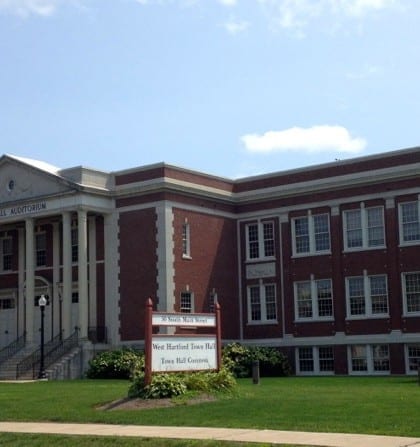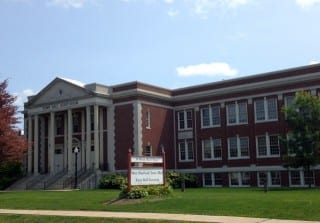West Hartford Town Council Adopts $267.9 Million Budget

Audio By Carbonatix

West Hartford Town Hall. Photo credit: Ronni Newton
The West Hartford Town Council voted Monday night to adopt a General Fund budget that increases taxes by 1.67 percent for the average homeowner.

West Hartford Town Hall. Photo credit: Ronni Newton
By Ronni Newton
The Town Manager’s proposed 2016-2017 budget, with modifications made last week due to the state’s budget crisis and uncertainty about how much state grant funding West Hartford will receive, was adopted by the Town Council Monday night in a 6-3 roll call vote along party lines.
The revised budget presented by Town Manager Ron Van Winkle totals $267.9 million, reduced from the $269.3 million figure proposed in March. The 2015-2016 budget was $258 million.
The mill rate for 2016-2017 will be 39.51 for real and personal property. The mill rate for automobiles, which is capped by the state beginning July 1, 2016, will be 32 mills. Last year’s mill rate was 38.31 mills.
The mill rate cap on automobiles makes it difficult to calculate the tax increase for homeowners because there is a large variance in the number and value of residents’ vehicles, but the tax increase for an “average” homeowner – with a residence assessed at $224,000 and two vehicles assessed at $9,000 each, will be 1.67 percent. Director of Financial Services Peter Privitera said that translates into $155 per year.
Mayor Scott Slifka, who plans to resign in May, said he was a bit wistful about this being his last budget. “West Hartford’s identity for past 50 years has been top-notch schools and safe, beautiful neighborhoods,” he said.
The town looks at its budgets with a long-term view, with no gimmicks, Slifka said. “What are our residents getting with this budget? … The answer to me is they’re getting the best town in Connecticut.”
Deputy Mayor Shari Cantor, who has chaired the council’s Finance and Budget Committee for more than a decade, said that the budget respects every dollar spent by the taxpayers. “There have been no gimmicks and no short-term fixes,” she said.
There’s a reason why West Hartford has retained its triple-A rating by both Moody’s and Standard & Poors, Cantor said. Even during difficult times we do our best to maintain “responsibility, accountability, and affordability.”
Minority Leader Denise Hall said that the state’s budget process has “reached new levels of absurdity, dysfunctionalism, uncertainty, and just plain confusion” that has injected a huge amount of guesswork into developing a local budget since grant funding has been such a moving target.
Although she appreciated the work that went into crafting the budget, Hall chose to vote against it. The cumulative effects of discretionary spending, she said, have gotten the town to the point where the budget increases have far exceeded the rate of inflation, but without additional services being provided. “Our increases just keep building year after year after year – meaning that many residents will have trouble keeping up with the rate of increase in their taxes,” Hall said.
Citing one specific example, she said, “I love the idea of new science labs at Hall [High School], but honestly I am floored that we can’t build eight classrooms for under $12.8 million dollars.”
Republican Chris Barnes agreed with Hall’s statements and also voted against the budget, stating that we need to look “holistically” at where we are. “Where does it end? We need to stop roll-forward and maintenance budgets. We need to start budgeting by what we have to spend,” Barnes said, starting with a zero percent increase. “Clearly we know how to make budget cuts when we are forced to,” he said.
Ben Wenograd voted in favor of what he called a “good” budget, that “funds current programs and past liabilities without any tricks.”
“Obviously the state isn’t running nearly as well as West Hartford,” said Beth Kerrigan. “Without a doubt this is one of the most transparent processes I have experienced,” she said of the budget process.
Judy Casperson, in declaring her support for the budget, praised the town for “keeping it smart, keeping it focused, keeping it moving us forward” despite the crisis at the state level.
Republican Chris Williams cast his vote against the budget, claiming that West Hartford is becoming increasingly unaffordable and that will drive people out of town. “A huge part of West Hartford’s character is going to leave with them,” he said.
Leon Davidoff said he was disappointed that the vote to adopt the budget would not be unanimous, and said that tough decisions require strong leadership. “This is a realistic budget which in my opinion meets the needs of the community,” he said.
Davidoff said that he did not get any emails opposing the budget and only nine people turned out to speak at hearings, which he believes means that people trust that the Town Council will do the right thing.
As for replacing the Hall High School science labs, Davidoff said that the most recent accreditation report suggested that something needed to be done about the 50-years-old labs. “Our responsibility is to make certain that our students are given all the tools necessary to succeed with academic excellence,” he said.
The town’s budget was reduced by approximately $1.5 million from the town manager’s initial proposal after Gov. Dannel P. Malloy released an unprecedented second budget earlier this month that would cut West Hartford’s state funding by $3.2 million. While no one knows what the state will ultimately do, the town had to approve its budget before the state votes and felt it was prudent to assume that ECS funding would be decreased by $1.5 million from what was originally proposed.
Privitera said that if even if the state approves a budget that cuts West Hartford’s appropriation by the entire $3.2 million, there will be surplus left available as a one-time revenue source to fund the remainder of the shortfall.
Like what you see here? Click here to subscribe to We-Ha’s newsletter so you’ll always be in the know about what’s happening in West Hartford!



